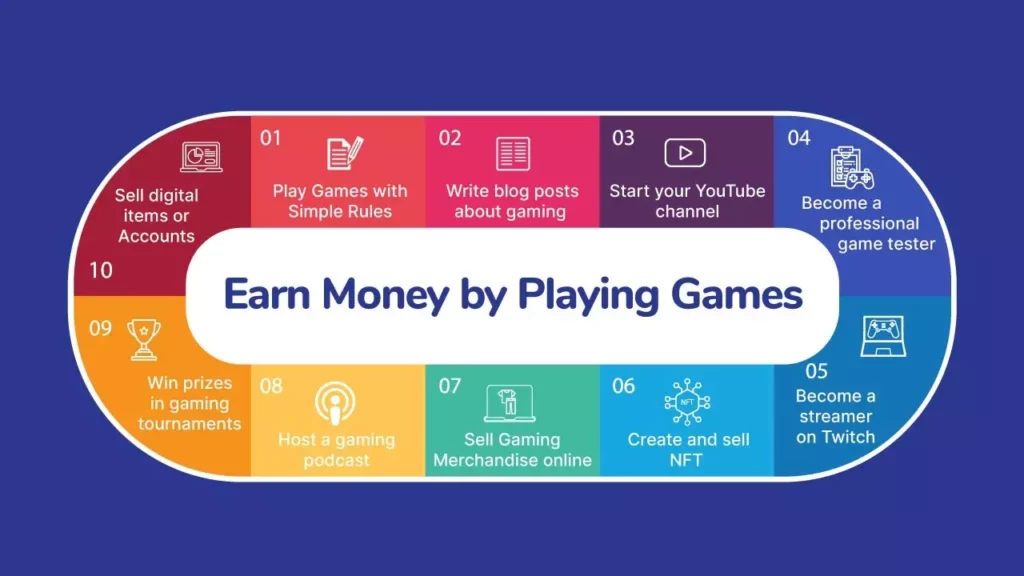Exploring the Best Play to Earn Games for Earning Rewards and Fun
Exploring the Best Play to Earn Games for Earning Rewards and Fun
Blog Article
Exactly How Play-to-Earn Gamings Are Changing the Pc Gaming Sector

Recognizing Play-to-Earn Mechanics
The play-to-earn model has arised as a cutting edge concept within the pc gaming sector, fundamentally altering the connection between gamers and the video games they involve with. This version enables players to earn concrete benefits, often in the form of cryptocurrencies or non-fungible symbols (NFTs), via their in-game tasks. Unlike traditional video gaming structures that commonly monetize through registration costs or single acquisitions, play-to-earn games incentivize player involvement by directly connecting gameplay accomplishments to real-world worth.
At the core of play-to-earn technicians is the assimilation of blockchain modern technology, which guarantees transparency and provable ownership of in-game possessions. Players can purchase, sell, or trade these assets in decentralized industries, equipping them with economic agency previously undetected in standard pc gaming settings. Each gamer's contribution to the game community-- be it through proficient play, critical trading, or area involvement-- enhances the total pc gaming experience while giving them a possibility to produce income.
As gamers spend time and resources, they not only grow their interaction with the video game yet also cultivate a vibrant economic situation that mirrors their cumulative initiatives (play and earn rewards). This improvement of gameplay into a monetizable endeavor is reshaping both gamer inspiration and video game style
Financial Influence On Players

Furthermore, play-to-earn models democratize access to economic advantages. Players from differing socio-economic histories can take part and possibly make substantial revenue, linking spaces that exist in conventional task markets. This paradigm shift cultivates financial independence, specifically in areas where work opportunities may be restricted.
Furthermore, the introduction of digital economic situations enables players to build wide range with tactical financial investments in in-game possessions, which can value with time. This has brought about the introduction of a new course of players who come close to play-to-earn as a major income-generating task, commonly resulting in the reinvestment of profits into the video gaming community itself. Inevitably, the economic influence on players is profound, as they browse a landscape where leisure and source of income converge.
The Duty of Blockchain Innovation
What makes blockchain modern technology a cornerstone of play-to-earn video games is its capacity to offer security, decentralization, and transparency. By making use of a distributed ledger system, blockchain makes certain that all transactions within the game are taped in an unalterable manner, enabling players to validate possession of in-game properties without depending on a main authority. This transparency fosters count on among players, as they can individually validate the scarcity and provenance of digital products, improving their worth.
Additionally, blockchain modern technology equips gamers through decentralization, enabling them to take part in peer-to-peer deals. Players are no longer constrained to in-game economies regulated by programmers; instead, they can trade, market, or lease their possessions easily in open marketplaces. This shift not just increases the general liquidity of digital properties however likewise urges even more significant player interaction, as individuals can straight gain from their time and effort invested in the game.
In addition, blockchain facilitates the development of smart agreements, which automate different in-game processes, from incentives circulation to governance mechanisms. play and earn rewards. This innovation minimizes the danger of fraud and makes sure justice, further solidifying blockchain's essential duty in the evolution of play-to-earn gaming
Objections and obstacles
Often, play-to-earn games encounter significant this page obstacles and objections that can prevent their development and acceptance within the more comprehensive gaming area. One main problem is the possibility for a speculative bubble, where the worth of in-game properties can fluctuate substantially, bring about economic losses for players. This volatility undermines the stability that traditional video gaming atmospheres typically provide.
Moreover, the combination of blockchain technology often raises concerns concerning ecological sustainability. The energy usage linked with specific blockchain networks has actually stimulated disputes concerning the eco-friendly effect of these video games. Doubters argue that the carbon footprint created by play-to-earn platforms could discourage eco-conscious gamers.
Furthermore, there are problems about accessibility and inclusivity. Several play-to-earn video games require players to spend substantial upfront resources to obtain needed assets, developing barriers for those with restricted funds. This version can inadvertently produce a divide between wealthier gamers and those that can not afford to take part.
Future Patterns in Gaming
As the gaming industry remains to develop, several future patterns are emerging that assurance to improve the landscape of play-to-earn games and past. One substantial fad is the boosting combination of blockchain technology, which enhances openness and safety in purchases. This will likely result in greater depend on among players, encouraging larger fostering of play-to-earn designs.
Furthermore, the surge of non-fungible tokens (NFTs) is readied to change electronic possession, permitting gamers to truly own in-game assets. This shift will not only equip players yet also create brand-new economic possibilities within the digital environment. In addition, the convergence of gaming with various other sectors, such as social media sites and decentralized money (DeFi), is anticipated to cultivate cutting-edge gameplay mechanics and monetization strategies.
Furthermore, innovations in man-made intelligence and machine knowing will allow much more tailored pc gaming experiences, satisfying private gamer preferences and improving involvement. The expanding emphasis on community-driven growth will likely affect video game design, as gamers significantly take part in shaping their video gaming settings. Jointly, my explanation these fads indicate a transformative future for the video gaming industry, where play-to-earn models will certainly play a central duty in redefining player communication and worth development.
Conclusion
To conclude, play-to-earn video games represent a substantial shift in the video gaming market, cultivating economic possibilities via cutting-edge auto mechanics that leverage blockchain innovation. This model not only democratizes access to economic advantages for gamers from numerous socio-economic backgrounds but likewise encourages community interaction and empowerment. Regardless of encountering difficulties and objections, the potential for future innovations suggests that play-to-earn games will certainly remain to shape the video gaming landscape, providing new methods for riches production and player participation.
The appearance of play-to-earn video games stands for a considerable change in the video gaming market, improving the connection between players and the electronic economy (play and earn rewards).The play-to-earn version has emerged as a cutting edge principle within the video gaming sector, basically changing the relationship between players and the games they involve with. Unlike standard visit homepage pc gaming structures that commonly generate income from via registration charges or single purchases, play-to-earn video games incentivize gamer involvement by directly linking gameplay success to real-world value
These innovative gaming platforms encourage players to generate real-world earnings via their in-game tasks, thereby changing the standard idea of pc gaming from a simple leisure activity into a practical financial chance. In spite of encountering objections and obstacles, the potential for future improvements recommends that play-to-earn video games will certainly proceed to shape the gaming landscape, supplying new opportunities for riches creation and gamer involvement.
Report this page